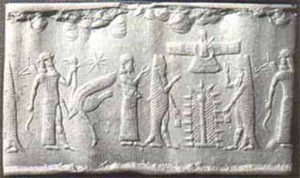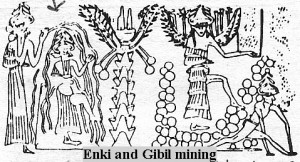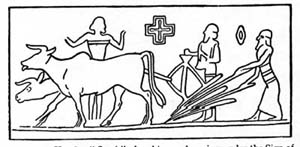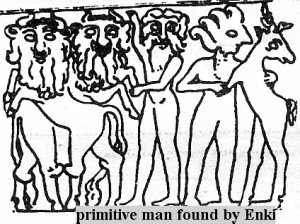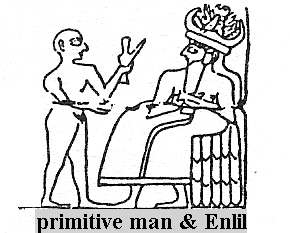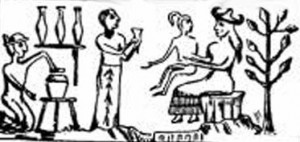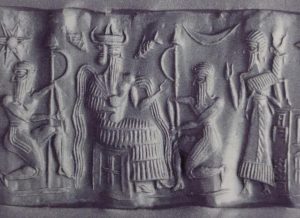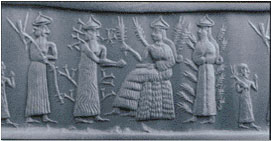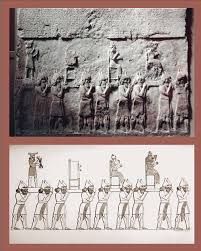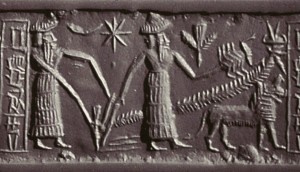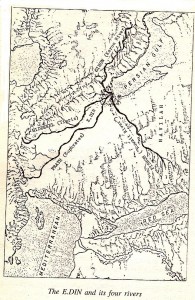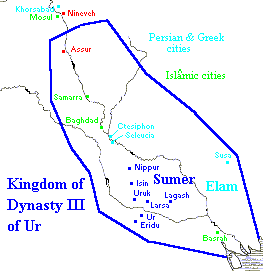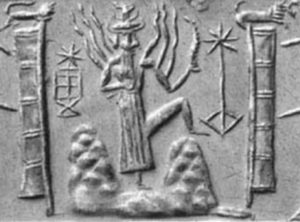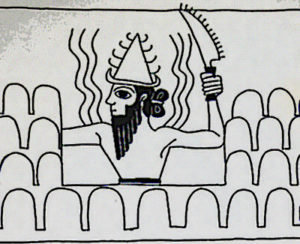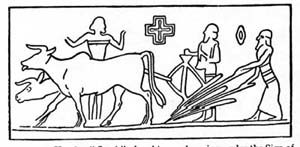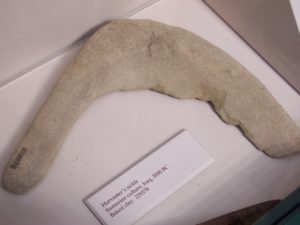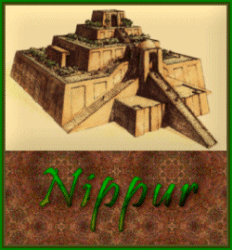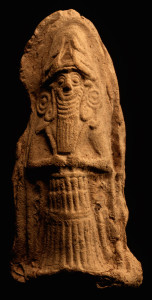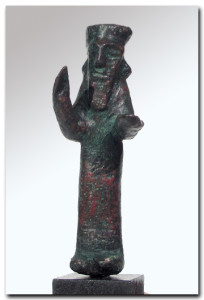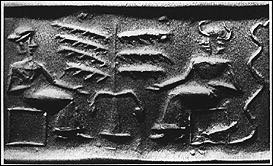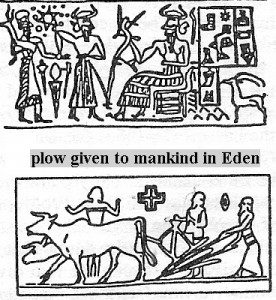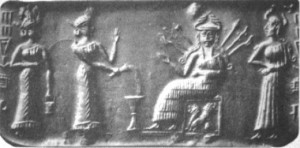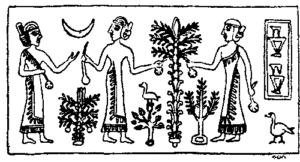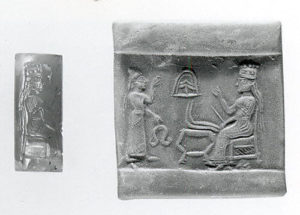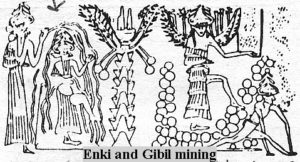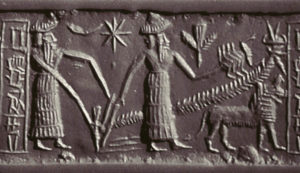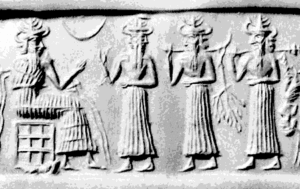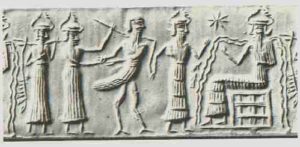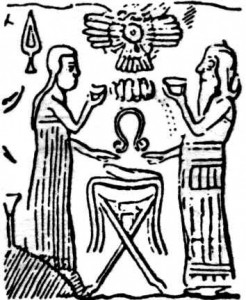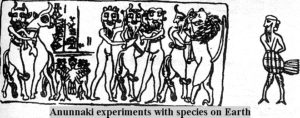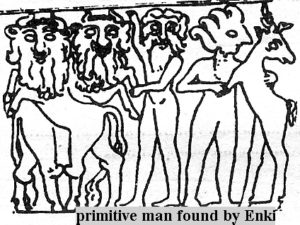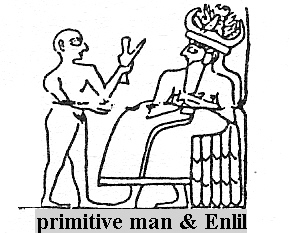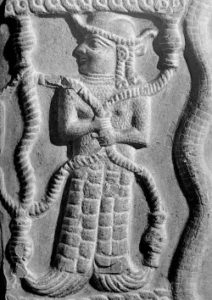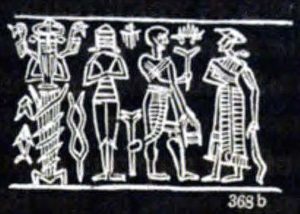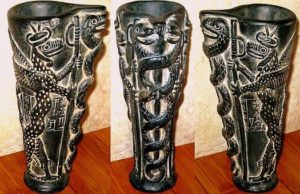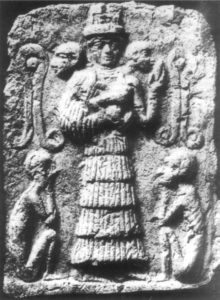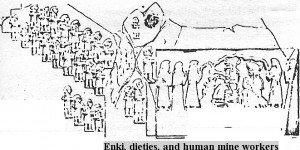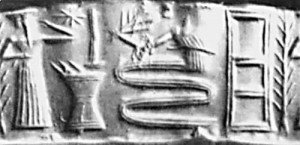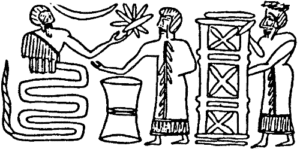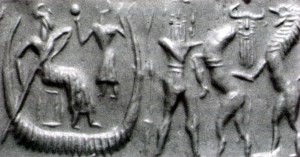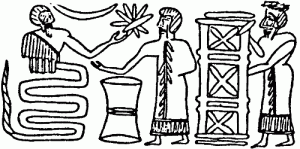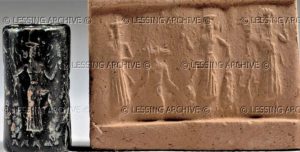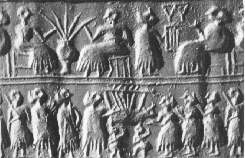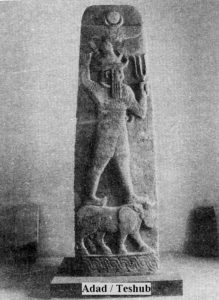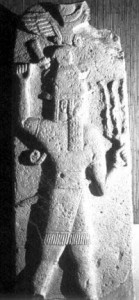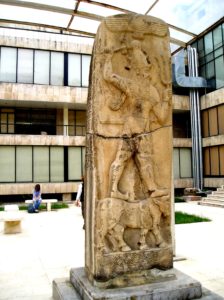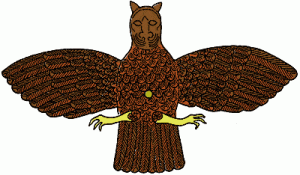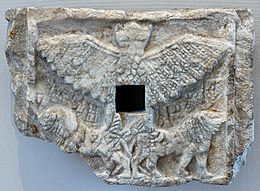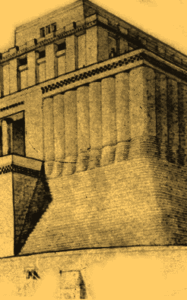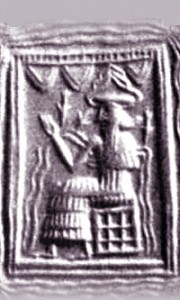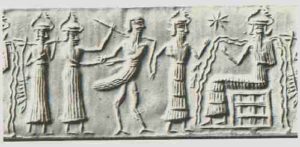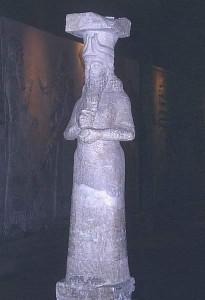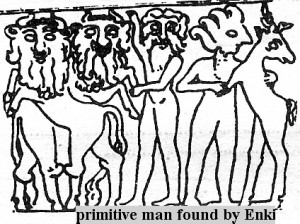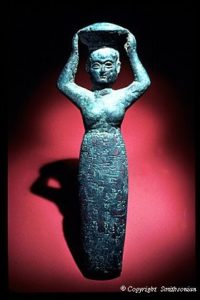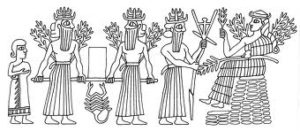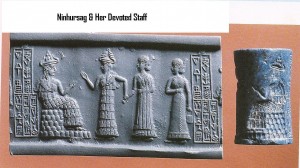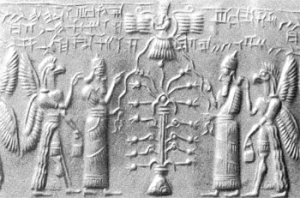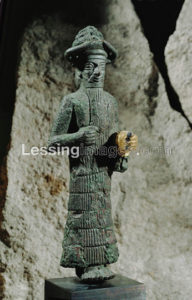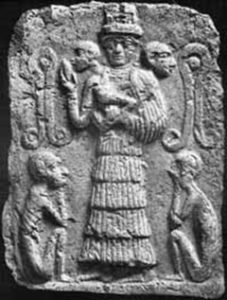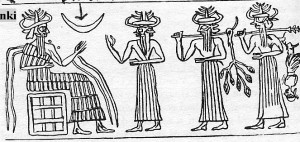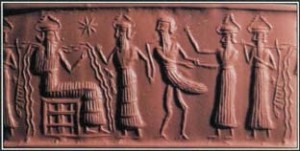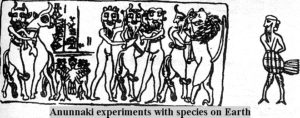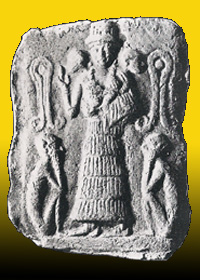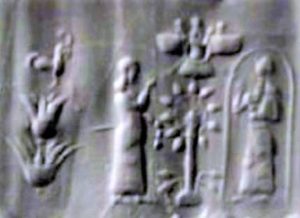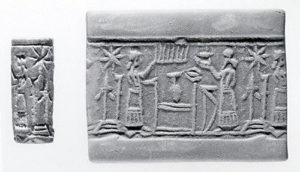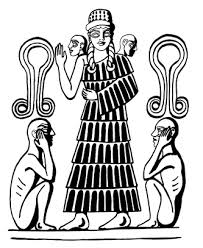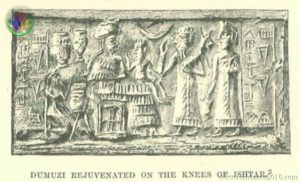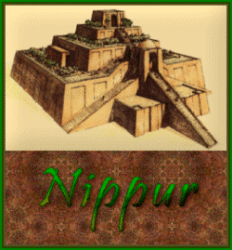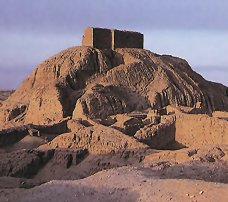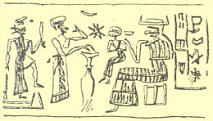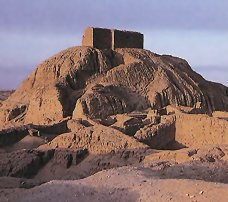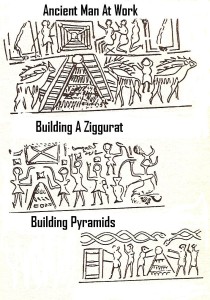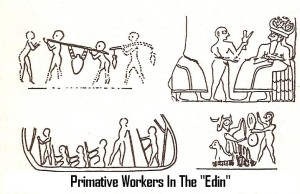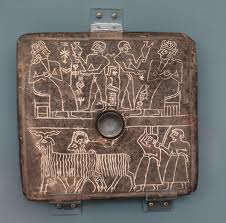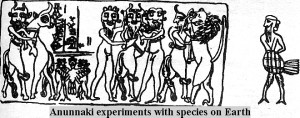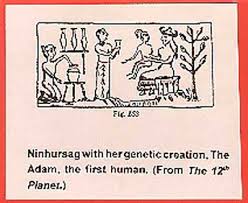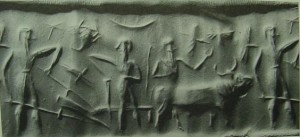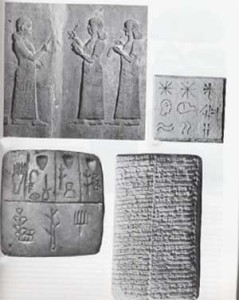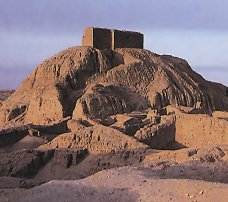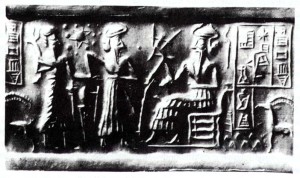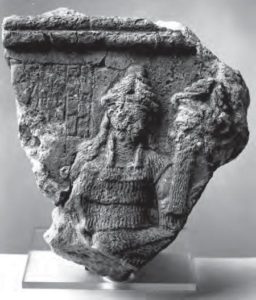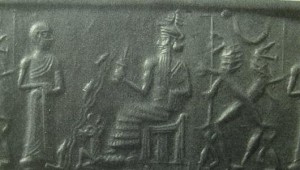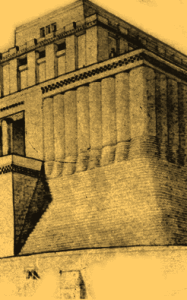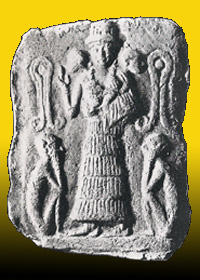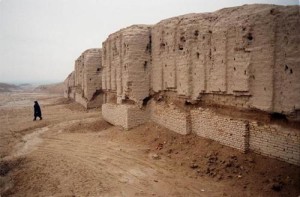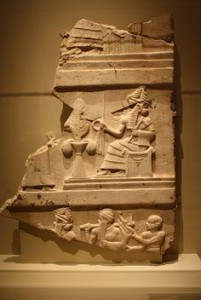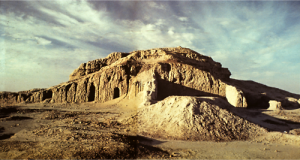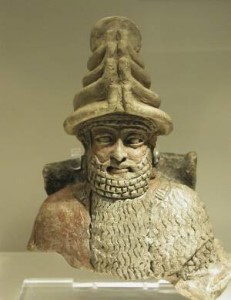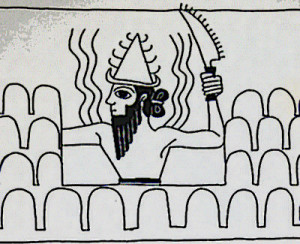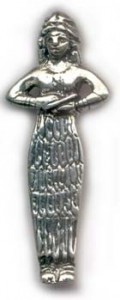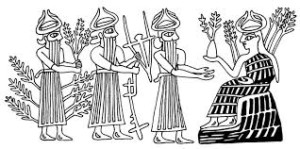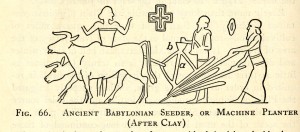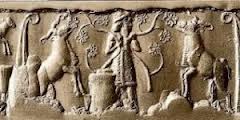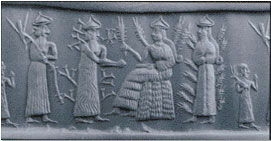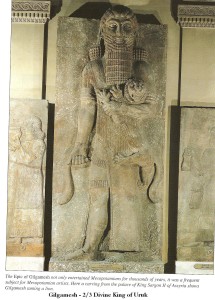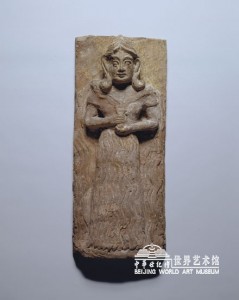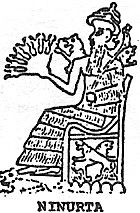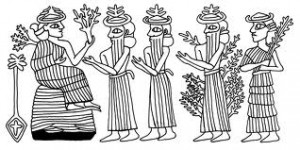translated by Tikva Frymer-Kensky
This translation of fragments from the Atrahasis is taken from O’Brien, J., and Major, W., In the Beginning, copyright Scholars Press, 1982.
(Texts: All Artifacts, Color Coding, & Writings in Bold Type With Italics Inside Parenthesis, are Added by Editor R. Brown, not the Authors, Translators, or Publishers!)
(gods in blue …mixed-breed demigods in teal…)
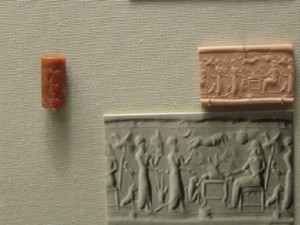 (Anunnaki alien giants settle on Earth Colony)
(Anunnaki alien giants settle on Earth Colony)
Worker Gods Rebel
(I:1-73) When the gods, like man, bore the work, carried the labor-basket-
the labor-basket of the great gods- the work was heavy, much was the distress.
The seven great Anunnaki (Anu, Enlil & royal descendants) caused the Igigi to bear the work.
Anu their father was king (King of Heaven / Nibiru & Earth Colony).
Their counselor was hero–Enlil.
Their “throne-bearer” was Ninurta (Enlil‘s son & heir, born of the “double seed” law of succession).
And their sheriff was Ennugi (minor son to Enlil).
These are the ones who seized power.
The gods cast lots and divided (the Cosmos):
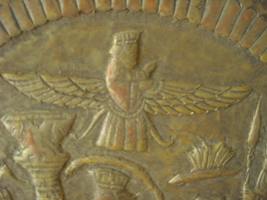 (Anu, father in heaven / planet Nibiru to royal descendants he put in charge of Earth Colony)
(Anu, father in heaven / planet Nibiru to royal descendants he put in charge of Earth Colony)
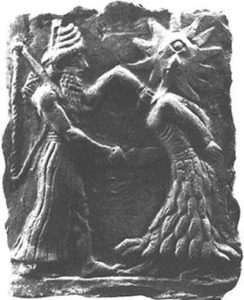 (Enlil, Anu‘s son & heir, Anu‘s Earth Colony Commander)
(Enlil, Anu‘s son & heir, Anu‘s Earth Colony Commander)
[Enlil had] the earth as his subject;
[the lock,] the snare of the sea [was given] to Enki the wise.
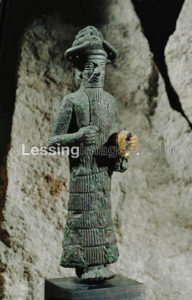
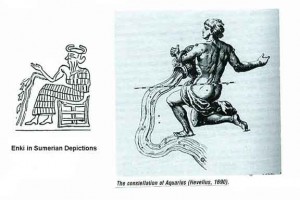 (Enki, King Anu‘s eldest wisest son)
(Enki, King Anu‘s eldest wisest son)
[After Anu] went up to heaven [and Enki w]ent down [to the ap[su, . . .
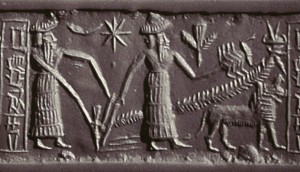 (alien gods farming the earth, forced into burdensome work)
(alien gods farming the earth, forced into burdensome work)
(they caused] the Igigi (lesser gods under Enlil & Enki) [to bear the work].
21-36. These lines are fragmentary. Enough is left, however, to reveal that the gods’ work includes digging the Tigris and Euphrates rivers.
. . .
Forty more years . . . they bore the labor night and day.
They [weariedl, complained, [grum]bled in the workpits.
“Let us confront the throne-bearer that he may remove from us our [hea]vy labor.
. . . come on, let us confuse him in his dwelling,
 (Enki‘s group mining in SO Africa demanded to trade places, leading to battle with Enlil‘s group farming in the “Eden”)
(Enki‘s group mining in SO Africa demanded to trade places, leading to battle with Enlil‘s group farming in the “Eden”)
Enlil, the counselor of the gods, the ‘hero,’ come on, let us confuse (?) him in his dwelling.”
47-60. Most of these lines are lost, fragmentary, or repetitious. But it is clear that one of the worker gods is speaking to the others and exhorting them to rebel. His speech ends with the following:
“Now, engage battle, stir up war and hostilities.”
The gods listened to his words.
They set fire to their implements, to their spades (they set) fire, their labor-baskets into the flames they threw.
They held them (as torches); they went to the gate of the shrine of hero Enlil.
It was night; at mid-watch the house was surrounded; the god did not know.
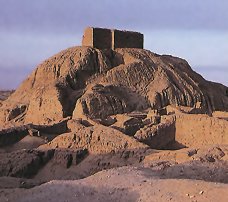 (E-kur, Enlil‘s ziggurat residence in Nippur, Earth Colony Command Central)
(E-kur, Enlil‘s ziggurat residence in Nippur, Earth Colony Command Central)
It was night; at mid-watch the Ekur was surrounded; Enlil did not know.
Enlil is Awakened
(I:74-98) Kalkal (Enlil‘s butler) observed and was disturbed.
He slid the bolt and looked [outward].
Kalkal awakened [Nusku (Enlil‘s chancellor & minor son)].
They listened to the noise of [the Igigi].
Nusku awakened [his] lord, made [him] get out of bed. ”
My lord, [your hou]se is surrounded; battle has come up to your gate.
Enlil, your [house is surroun]ded; battle has come up to your gate.”
Enlil had [his servant] come down into his dwelling.
Enlil opened his mouth and said to his vizier Nusku, ”
Nusku, lock your gate, take your weapon, stand before me.”
Nusku locked his gate, took his weapon and stood before Enlil.
Nusku opened his mouth and said to hero Enlil:
“My lord, these children are your own; they are your sons; why are you afraid?
Enlil, these children are your own; they are your sons; why are you afraid?
Send (the order) let them bring Anu down (to earth); let them bring Enki into your presence.”
(gods who came down, put on wet suits, & swam to shore; King Anu‘s royal descendants in procession on Earth Colony)
Chief Gods Hold Council
(I:99-177) He sent and they brought Anu down; they brought Enki into his presence.
Anu, king of heaven, was seated.
The King of the Apsu, Enki, was in [attendance]; the great Anunnaki were seated.
Enlil arose . . .
Enlil opened his mouth and said to the great [gods]: “Against me have they come?
They have waged war …
Battle has come to my gate.”
Anu opened his mouth and said to hero Enlil,
“The matter of the Igigi– has its reason been brought to you?
Let Nusku go out.
16-37. These lines ate too fragmentary for translation.
Enlil opened his mouth and said to (his vizier Nusku],
“Nusku, open [your gate], take your weapon.
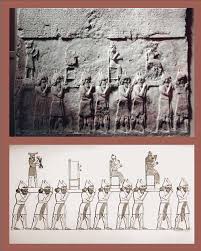 (hierarchy amongst the giant royal alien descendants of Anunnaki King Anu)
(hierarchy amongst the giant royal alien descendants of Anunnaki King Anu)
In the assembly [of all the gods] bow down, stand up, [say to them]:
[Your father] Anu has sent me, your counselor [hero Enlil],
your throne-bearer [Ninurta], and your sheriff [Ennugi].
Who is the one [who instigated] battle?
Who is the one who [provoked] hostilities?
Who is the one [who started the war?”
131-58. Most of these lines are either fragmentary or repetitious. It seems that Nusku goes to the rebel gods and repeats Enlil‘s words as he was instructed. Then, he returns to Enlil with their reply which he repeats as follows:
“Every [single one of us g]ods has started the war.
We . . . in the workpits.
(Anunnaki aliens working the fields, working the mines, etc., establishing bases for their long stay on Earth Colony)
Excessive [labor] has killed us; our wo[rk was heavy], much was the distress;
[and every] single one of us gods has spoken . . . with Enlil.”
Enlil heard these words and his tears flowed.
Enlil [heard] these words; he said [to] hero Anu,
“Noble one, with you in heaven carry your authority, take your power.
With the Anunnaki seated before you, call one god, let him be thrown to the netherworld.”
Anu opened his mouth and said to the gods, his brothers,
“Why are we accusing them? Their work is heavy, much is their distress.”
(I:178-220) 178-88. There is a small gap in the text here. In later versions of the story, Enki, rather than Anu, is speaking at this time. In those versions Enki reveals his plan for creating the human race. In this version he is probably speaking when the story resumes:
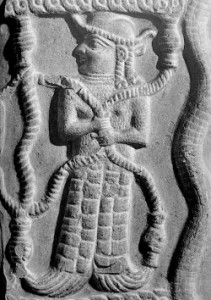 (Ninhursag, Anu‘s daughter, Enlil‘s 1/2 sister, DNA Medical Scientist Specialist)
(Ninhursag, Anu‘s daughter, Enlil‘s 1/2 sister, DNA Medical Scientist Specialist)
“While [Nintu (Ninhursag) the birth-goddess] is present,
let the birth-goddess create the offspring, let man bear the labor-basket of the gods.”
They called the goddess and asked [her], the midwife of the gods, wise Mami (Ninhursag): ”
You are the birth-goddess, creatress of man.
(Enki & Ninhursag took earthlings from wild man to “modern man” in a blink of the eye, 50,000 years, creating a “missing link”)
Create lullu-man (Primitive Man), let him bear the yoke.
Let him bear the yoke, the work of Enlil; let man carry the labor-basket of the gods.”
Nintu opened her mouth and said to the great gods, ‘It is not properly mine to do these things.
He is the one who purifies all; let him give me the clay, and I will do (it).”
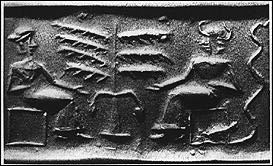
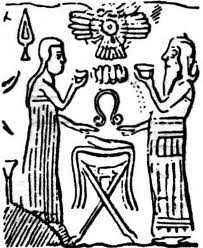 (Ninhursag & brother Enki in the Kish DNA lab)
(Ninhursag & brother Enki in the Kish DNA lab)
Enki opened his mouth and said to the great gods:
“At the new moon, the seventh day, and the full moon, I will set up a purifying bath.
Let them slaughter (extract DNA from) one god.
Let the gods be purified by immersion.
With his flesh and blood let Nintu mix the clay.
God and man- (DNA) let them be inseparably mixed in the clay; till the end of time let us hear the ‘drum.’
Let there be spirit from the god’s flesh; let her proclaim ‘alive’ as its sign;
for the sake of never-forgetting, let there be spirit.”
In the assembly, “Aye (Utu’s spouse),” answered the great gods, the administrators of destiny.
Human Race is Created
(I:221-304) At the new moon, the seventh day, and the full moon, he set up a purifying bath.
We-ila (unidentified), who had rationality, they slaughtered in their assembly.
With his flesh and blood (DNA, alien technology) Nintu (Ninhursag) mixed the clay.
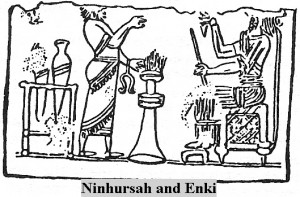
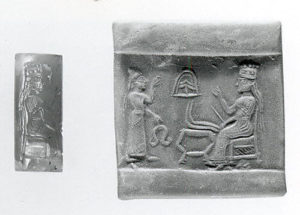 (Ninhursag in her DNA lab)
(Ninhursag in her DNA lab)
Till the end [of days they heard the drum].
From the flesh of the god there was spirit.
She proclaimed “alive” as its sign.
For the sake of not-forgetting there was a spirit.
After she had mixed the clay, she called the Anunnaki, the great gods.
The Igigi, the great gods, cast their spittle (DNA) on the clay.
Mami (Ninhursag) opened her mouth and said to the great gods,
“You commanded me a task-I have completed it.
You slaughtered a god together with his rationality.
I have removed your heavy labor, have placed your labor-basket on man.
(alien Anunnaaki Chief Medical Scientist Ninhursag & Enki with the 1st “modern man” fashioned from her DNA lab)
You raised a cry for mankind; I have loosened your yoke, have [established] freedom.
They heard this speech of hers; they ran around and kissed her feet.
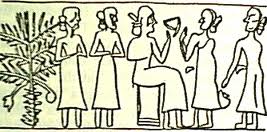 (Ninhursag & helpers)
(Ninhursag & helpers)
“Formerly we called you ‘Mami.’
Now, may ‘Mistress of all the gods’ be your [na]me.
They entered the house of destiny,
Prince La (unidentified) and wise Mami.
With the birth goddesses assembled, he trod the clay in her presence.
She recited the incantation again and again.
Ea (Enki), seated before her, prompted her.
When she finished her incantation, she nipped off fourteen pieces of clay.
Seven pieces to the right, seven to the left, she placed.
Between them she placed the brick.
260-76. There is a gap in the text here. From an Assyrian version we learn that fourteen birth goddesses shape the clay. They make seven males and seven females and align them in pairs.
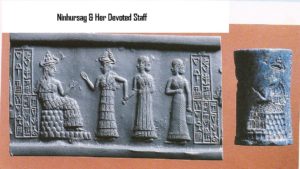 (NInhursag‘s nurses step forward as “birth goddesses“)
(NInhursag‘s nurses step forward as “birth goddesses“)
[The birth g]oddesses were assembled; Nintu was seated.
She counted the months.
At the destined [moment], they called the tenth month.
The tenth month came.
The end of the period opened the womb.
Her face was beaming, joyful.
Her head covered, she performed the midwifery.
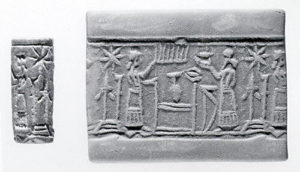 (Nintu‘s / Ninhursag & Enki in the lab)
(Nintu‘s / Ninhursag & Enki in the lab)
She girded her loins; she made the blessing.
She patterned the flour and laid down the brick.
“I have created, my hands have done it.
Let the midwife rejoice in the prostitute’s (?) house;
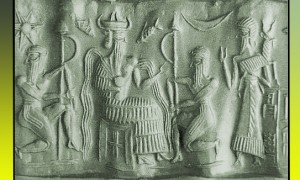 (Enki with the new species of earthlings, “modern man”, the worker)
(Enki with the new species of earthlings, “modern man”, the worker)
where the pregnant woman gives birth, the mother of the baby severs herself.
Let the brick be laid down for nine days that Nintu the midwife be honored.
Let them continually call Mami their . . . praise the birth goddess, praise Kesh (her city of Kish).
When the bed is laid let husband and wife lie together.
When for wifehood and husbandhood they heed Ishtar (Inanna) in the house of the father-in-law,
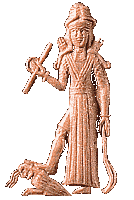 (Inanna, Nannar‘s daughter, Enlil‘s granddaughter, Goddess of Love & War)
(Inanna, Nannar‘s daughter, Enlil‘s granddaughter, Goddess of Love & War)
let there be rejoicing for nine days; let them call Ishtar Ishara.
305 -end. After a gap of approximately fifty lines, the story continues. Twelve hundred years later Enlil is trying to destroy the human race because it is making too much noise. (Noah‘s Flood)
